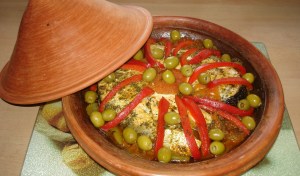Eating from the same dish:Respectful or immoral?
Eating habits, just like food preparations, have undergone many changes. People, especially in rural areas, used to eat food collectively. However, with the advances in industry and invention, these habits have taken new forms; the use of all sorts of table spoons and forks has become common between different countries and civilizations. This distinction or division in eating habits can be seen in the Moroccan society. Although some people think that Moroccans should give up eating from the same dish, this habit is actually supported by cultural, religious, and ethical reasons.
Many people around the world share the belief that eating from the same dish is not an aspect of culture. However, this eating habit is not only applied in Morocco and the Arab world, but it is also a cultural behavior shared by different countries throughout the world. The Moroccan kitchen, with all its special foods and ingredients is a cultural icon, and eating from the same dish is what characterizes the food culture. The Moroccan couscous for instance–which is now well known all around the world and is cooked in five stars restaurants in Paris, Dubai, and Istanbul–is always eaten collectively from one dish. Although it is served to be eaten individually in some places, it is the appeal of eating it collectively that makes it special.
Another argument delivered by the supporters of eating individually suggests that this habit is a behavior adapted from animals, especially from monkeys. Nevertheless, this cannot be validated, since the habit of eating from the same dish was inherited from previous generations; from the Middle Ages, and throughout history, people used to gather together with family and relatives and used to treasure eating as one family.
In our Moroccan culture, we have the concept of “Al Baraka” which is an Arabic term referring to a sense of divine presence or a type of spiritual energy believed to exist according to specific environments or atmospheres. This idea is, in fact, common between Moroccans; it is believed that when a family is gathered to eat collectively at the convenient time of eating, “Al Baraka” will exist as blessings from God to each member of the family; however, when a person eats individually, it is seen as if he is just fulfilling his own physiological needs, or satiating his hunger. Thus, in Morocco, people do not eat just for the sake of satiating hunger, eating is, actually, a cultural and religious practice.
The last argument presented by the opponents of eating from the same dish brings about ethical and moral issues. They claim that eating collectively from one dish is disgusting and unhealthy and this makes it an immoral practice. Conversely, what is immoral and unethical in Morocco is, in fact, eating alone or after the convenient time of the meal.
Lunch and dinner are the most important meals in Morocco, and the specific moment of each meal must be respected within the family. Therefore, when lunch is served at 12 or 1 P.M, it is better to eat it at that moment and to be present to share it with all the members of the family and relatives. This act, in Moroccan society, is a sign of respect not only to the food but to the family members as well.
Given the previously discussed arguments, it should be evident that eating from the same dish is a cultural aspect and an inherited practice that is valued and accepted among all Moroccans. Although the Moroccan kitchen is being affected every day by its counterparts, from the Europe and the United States with fast food spreading out and being popularized throughout the country, the Morocco’s everlasting eating habits will never perish since they are revived every single day in Moroccan houses and promoted all around the world.
Many people around the world share the belief that eating from the same dish is not an aspect of culture. However, this eating habit is not only applied in Morocco and the Arab world, but it is also a cultural behavior shared by different countries throughout the world. The Moroccan kitchen, with all its special foods and ingredients is a cultural icon, and eating from the same dish is what characterizes the food culture. The Moroccan couscous for instance–which is now well known all around the world and is cooked in five stars restaurants in Paris, Dubai, and Istanbul–is always eaten collectively from one dish. Although it is served to be eaten individually in some places, it is the appeal of eating it collectively that makes it special.
Another argument delivered by the supporters of eating individually suggests that this habit is a behavior adapted from animals, especially from monkeys. Nevertheless, this cannot be validated, since the habit of eating from the same dish was inherited from previous generations; from the Middle Ages, and throughout history, people used to gather together with family and relatives and used to treasure eating as one family.
In our Moroccan culture, we have the concept of “Al Baraka” which is an Arabic term referring to a sense of divine presence or a type of spiritual energy believed to exist according to specific environments or atmospheres. This idea is, in fact, common between Moroccans; it is believed that when a family is gathered to eat collectively at the convenient time of eating, “Al Baraka” will exist as blessings from God to each member of the family; however, when a person eats individually, it is seen as if he is just fulfilling his own physiological needs, or satiating his hunger. Thus, in Morocco, people do not eat just for the sake of satiating hunger, eating is, actually, a cultural and religious practice.
The last argument presented by the opponents of eating from the same dish brings about ethical and moral issues. They claim that eating collectively from one dish is disgusting and unhealthy and this makes it an immoral practice. Conversely, what is immoral and unethical in Morocco is, in fact, eating alone or after the convenient time of the meal.
Lunch and dinner are the most important meals in Morocco, and the specific moment of each meal must be respected within the family. Therefore, when lunch is served at 12 or 1 P.M, it is better to eat it at that moment and to be present to share it with all the members of the family and relatives. This act, in Moroccan society, is a sign of respect not only to the food but to the family members as well.
Given the previously discussed arguments, it should be evident that eating from the same dish is a cultural aspect and an inherited practice that is valued and accepted among all Moroccans. Although the Moroccan kitchen is being affected every day by its counterparts, from the Europe and the United States with fast food spreading out and being popularized throughout the country, the Morocco’s everlasting eating habits will never perish since they are revived every single day in Moroccan houses and promoted all around the world.


No comments:
Post a Comment